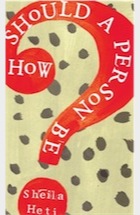[sung to the tune of “No Dogs Allowed“]
Frequently, I send myself links to articles that I’d like to read more closely. I have the best intentions of reading them. But, oftentimes, they languish in my inbox, with the subject heading, “link from twitter,” or on my safari reading list. When I finally get fed up with the growing mass of links, I give up and delete them. Or, if I’m feeling inspired, I spend some time reading them and crafting interesting connections between them. Since it seems like spring is finally coming to Minnesota (what a long, never-ending winter!), I’m inspired to clean out my links and spend a little time reflecting on them here today. The theme that connects them all: troubling elitism.
Source One
Academic writing: why no “me” in PhD? In this article, author Aslihan Agaogl laments how academic writing standards demand that academics stop using “I” in their articles, chapters, and dissertations. She writes: “by removing the first person point of view and the active voice from your writing, what you’re actually doing is removing yourself.” I agree. As I’ve written about in my book, Unofficial Student Transcripts, academic training, especially in graduate school, encouraged me to lose my voice and actively discouraged me from forging intimate connections with the ideas and theories I was encountering and using.
Agaogi’s big problem with the lack of “I” statements is that it makes academic writing too stuffy, boring and therefore inaccessible to most lay audiences. Academic writing is already alienating and esoteric enough, Agaogi argues. Academics need to infuse it with personality and “spice,” drawing readers in and enabling them to connect with the ideas. Again, I agree. But, I would have liked to see Agaogi pushing her argument just a little further to explore and trouble the underlying reasons why academics are supposed to remove themselves from their work, like: to perpetuate the myth that academic work is objective and that the ideas/”facts” generated by scholars are able to transcend particular perspectives, biases and political motivations.
In thinking about this article in the context of “no snobs allowed,” another reason academics aren’t supposed to use “I” is because it’s too informal; it makes your (one’s) writing seem less serious or rigorous. Academics believe themselves to be serious and formal and doing “important work” that can’t be done anywhere else. Agaogi echoes this in her essay when she writes:
Academia is supposed to be the place where knowledge is created; a place where people come to make an original contribution to the existing literature.
When I was in the academy I took myself pretty seriously. Even as I acknowledged and tried to honor the fact that lots of important ideas, theories, knowledge were developed outside of the academy, I believed that the academy was where real knowledge was produced. It’s taken me several years to become un-disciplined in those habits and beliefs.
To maintain their status and sense of worth as exalted expert smarty-pants, some (not all) academics feel compelled to sound serious and stuffy. Using “I” and writing less formally and with the acknowledgment that they are a person not just a giant brain with big ideas, is risky and difficult. It requires recognizing that academic ideas, while important, are not necessarily better than non-academic ideas and that Academics, while highly trained, with well developed critical thinking skills, aren’t by definition better (as in more serious, significant, thoughtful) than non-Academics.
Source Two
30 Things to Tell A Book Snob
Since I really dislike when people are snobby about what they read, watch, eat or listen to, I was happy to read this author’s various suggestions for telling snobs to fuck step off.
Here are a few of my favorites:
10. You don’t have to be serious about something to be serious about something.
17. Freedom is a process of knocking down walls. Tyranny is a process of building them.
22. Never make someone feel bad for not having read or not read something. Books are there to heal, not hurt.


